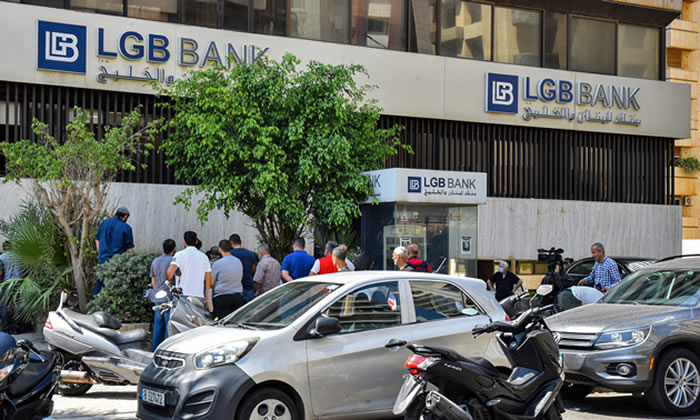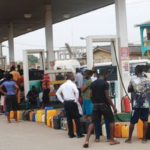
Five Lebanese banks were stormed Friday by depositors seeking to unlock frozen savings, the latest in a string of such “heists” in the crisis-hit country that has garnered wide public support.
Lebanon has been mired in an economic crisis for more than two years since the value of its currency began plummeting and banks started imposing draconian restrictions on withdrawals.
In the past week, seven bank branches have been targeted by “depositor heists”, prompting lenders to announce a three-day closure starting Monday, according to the Association of Banks in Lebanon.
As the incidents snowballed on Friday, Interior Minister Bassam Mawlawi called for an emergency meeting in the afternoon.
“Reclaiming rights in this way… can break the system and make the rest of the depositors lose their rights,” he told reporters after the meeting.
The holdup of a Beirut bank on Wednesday by an activist who filmed herself using a toy gun appears to have sparked a series of copycat raids by angry depositors.
On Friday there were another three such incidents in Beirut and two in south Lebanon, AFP correspondents and a security source said.
In one case, a man carrying a gun and jerrycan of fuel demanded staff at a branch of the Byblos bank in the southern town of Ghaziyeh hand over his money.
Accompanied by his son, he threatened bank staff with the gun, which a Lebanese television channel said may have been a toy, before making his demand.
“He emptied a jerrycan of fuel on the floor,” a bank security guard told an AFP correspondent.
The man walked away with about $19,000 in cash but turned himself in to police moments later as a crowd formed in front of the bank to support him.
– Not ‘a bank robber’ –
A few hours later in the Beirut neighbourhood of Tariq al-Jdideh, a tense security situation developed around a branch of Blom Bank, although details were unclear.
Witnesses outside the bank said a shop-owner had demanded access to his trapped savings to pay off debts.
He was locked inside the bank together with police officers, the witnesses told AFP at the scene, but was thought to be unarmed.
Another man armed with a hunting rifle stormed a bank in Beirut’s Ramlet el-Baida neighbourhood on Friday, witnesses told an AFP photographer at the scene.
The spate of heists comes two days after a young activist stormed a central Beirut bank with fuel and a plastic gun to demand the deposits of her sister, who needed to pay for cancer treatment.
The woman identified as Sali Hafiz made off with around $13,000 and became an instant hero on social media.
“She had every right to do this. I would do the same if I was as brave as her,” said Carla Chehab, a 28-year-old Beirut resident.
“The thieves are the banks, the government and all rich people protecting them,” she added.
– Emergency meeting –
The severity of Lebanon’s crisis has been widely blamed on a self-serving political elite and decades of corruption.
The currency has lost more than 90 percent of its value on the black market in recent years, while poverty and unemployment have soared.
Banks have been widely accused of operating like a cartel and of spiriting large amounts out of the country for senior Lebanese officials at a time when foreign transfers were already blocked for ordinary citizens.
A parliament session to approve the 2022 budget, a key reform needed for Lebanon to unlock billions of dollars from international lenders, was adjourned to September 26 on Friday after quorum was lost when some lawmakers walked out.
Last month, a man drew widespread sympathy after he stormed a Beirut bank with a rifle and held employees and customers hostage for hours, to demand some of his $200,000 in frozen savings to pay hospital bills for his sick father.
He was detained but swiftly released and was present Friday outside the bank in Tariq al-Jdideh to express his support.
The raids of recent weeks are seen as mostly acts of desperation by Lebanese depositors who do not have criminal records, garnering sympathy from the country’s main depositors’ association.
“We call on every depositor who refuses injustice, oppression and theft to support any depositor who asks for what is rightfully theirs,” association member Tala Khalil told AFP.
AFP




